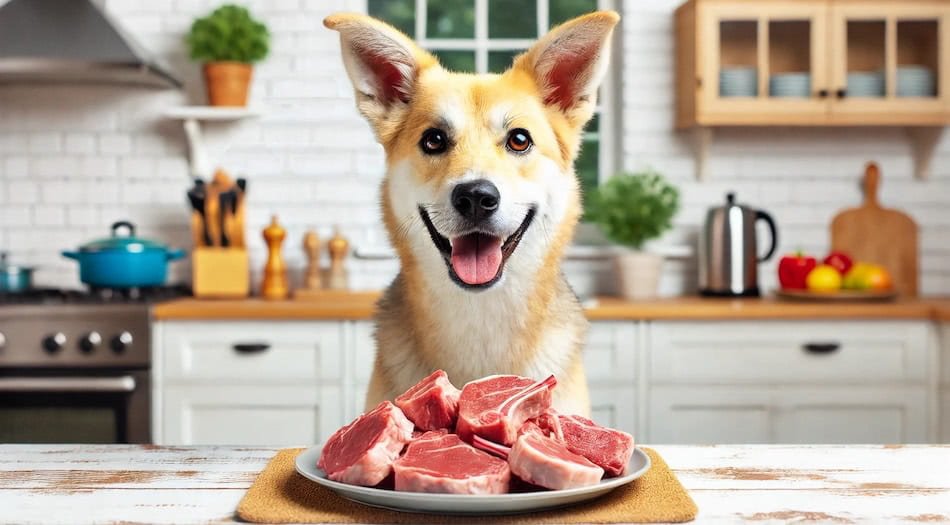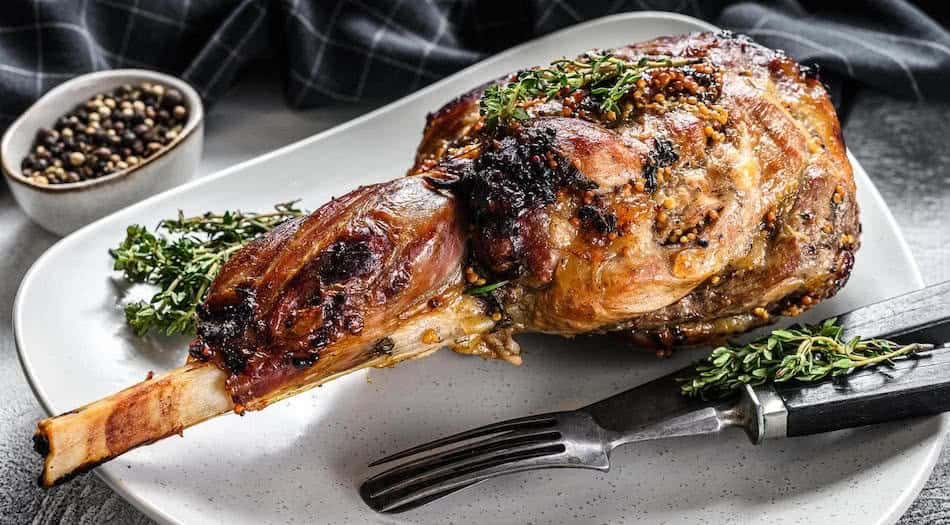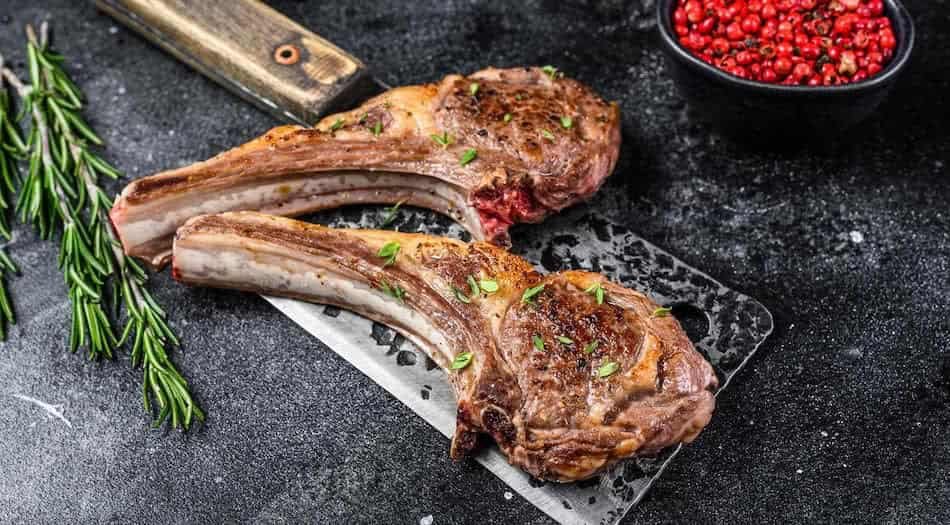When it comes to your furry friend’s diet, you might wonder, can dogs eat lamb? Yes, indeed they can. It can be a great way to add variety and nutrition to their meals.However, there are some considerations to keep in mind . Let’s dive into the various aspects of lamb safety for dogs, including the benefits and risks associated with it for your pup.

Before introducing any new foods to your dog’s diet, always consult your vet. Individual dogs may have different intolerances, dietary needs, and health considerations. This article is not a substitute for professional veterinary advice.
Benefits of Lamb for Dogs
Lamb is a fantastic option to include in your pet’s diet. It is packed with essential nutrients that contribute to a dog’s overall health. It’s a healthy protein source is rich in vitamins such as vitamin B12 and minerals like zinc, which are vital for maintaining strong bones and a robust immune system.
Lamb liver, in particular, is a nutrient-dense food that can be made into delicious treats for dogs. Including lamb in your dog’s diet can help improve their coat condition and energy levels.
Lamb can be a great alternative for dogs with food sensitivities or allergies to other protein sources. But make sure to balance it with other foods to ensure a well-rounded diet. Always consult with your vet before making significant changes to your dog’s food regimen to cater to their specific nutritional needs.

Risks of Eating Lamb for Dogs
While lamb can be a nutritious treat for your furry friend, there are several risks associated with feeding lamb to dogs. One major risk is the presence of lamb bones.
Lamb bones can splinter easily, which can be harmful and even life-threatening if ingested. These splinters can cause blockages in the digestive tract or lead to gastrointestinal tears.
If your pup has got hold of some lamb bone monitor for any signs that may indicate gastrointestinal obstruction or damage to their digestive tract. Common symptoms of a blockage include frequent vomiting, loss of appetite, abdominal pain, irregular stools and difficulty defecating can all be signs of concern.
Lamb bones can also harbor harmful bacteria that may cause foodborne illnesses. Make sure that the lamb you feed your dog is fully cooked to minimize the risk of harmful bacteria.
How To Give Lamb to Your Dog
Like all meats given to dogs, cooked lamb is best. It should be prepared without any seasonings or additives. This helps avoid any digestive issues or potential toxicities from added ingredients.
Some pet owners might choose to feed lamb raw, which can be beneficial for your dog’s diet in its natural state, however generally vets don’t recommend this because of risks of harmful bacteria. If you want to give your dog raw lamb, make sure to source high-quality, fresh lamb to minimize any risks.
When you feed lamb to your pup the first time watch for any signs of allergies or sensitivities. Remember, it’s always best to consult with your vet to tailor the feeding approach that suits your dog’s specific needs.

FAQs
You’ve got questions, and we’ve got answers! Read on to find out!
Can Dogs Eat Lamb Fat?
Lamb fat isn’t inherently toxic for dogs, but it’s not the healthiest option either. Consuming too much fat can lead to several issues, such as obesity and pancreatitis if consumed in large quantities. Lamb is a great protein and nutrient source, but it’s best to trim off excess fat before giving it to your dog, and some dogs may be more sensitive to fat than others. Always consult your vet if you’re unsure about adding something new to your dog’s diet. Overall, while a small amount of lamb fat may be okay occasionally, it’s best to focus on balanced nutrition to keep your furry friend happy and healthy.
Can Dogs Eat Lamb Kidneys?
The answer is yes, they can! Lamb kidney can be a highly nutritious addition to your dog’s diet. Rich in essential nutrients like iron, zinc, and vitamin B12, lamb kidney supports your dog’s overall health. These nutrients are important for maintaining healthy red blood cells and tissue growth. However, it’s important to feed lamb kidney in moderation. Too much can introduce risks such as an upset stomach or even potential toxicity. Always remember to prepare it properly by cooking it thoroughly to eliminate any harmful bacteria. Raw lamb kidney might contain pathogens that pose risks to your dog’s health. Another concern is allergies; observe your dog’s reaction the first time you offer lamb kidney to ensure they don’t have any adverse reactions. With proper preparation and monitoring, lamb kidney can be a beneficial treat that adds variety to your dog’s diet while boosting their nutrient intake.
Can Dogs Eat Lamb Heart?
Yes, dogs can eat lamb heart, and it’s an excellent source of protein for your furry friend. Lamb heart is packed with taurine and coenzyme Q10, which are crucial for heart and brain function. Taurine helps your dog build new proteins and supports cardiovascular health, while coenzyme Q10 acts as a powerful antioxidant, reducing inflammation and potentially preventing cancer. However, due to its high-fat content, lamb heart should be fed in moderation to avoid digestive issues. Always cook the heart thoroughly before serving to ensure it’s safe for your dog to enjoy as an occasional nutritious treat.
Can Dogs Eat Lamb Liver?
Yes, dogs can eat lamb liver, and this organ meat is like a doggy multivitamin because it’s rich in vitamin A, B vitamins, copper, and iron. Vitamin A is fantastic for your dog’s overall well-being and keeps their eyes healthy. The B vitamins benefit their whole body by maintaining cell health, boosting brain function, and forming DNA and red blood cells. Copper helps with brain function and metabolism, while iron works with copper to produce hemoglobin, which carries oxygen throughout your pup’s body. However, make sure they only eat a small amount of liver to prevent the risk of vitamin A toxicity. Always cook the liver to eliminate any potential bacteria, and serve it as an occasional treat rather than a regular meal component.
Can Dogs Eat Lamb Chops?
Lamb chops can be a tasty treat for dogs, but they must be served carefully. Always remove bones, as they can splinter and cause internal injuries. Trim any excess fat to avoid digestive issues and potential pancreatitis. Cook the meat without seasoning, spices, or marinades, as these can be harmful to dogs. Serve lamb chops in moderation to ensure a balanced diet and monitor for any signs of allergies or sensitivities.
Can Dogs Eat Lamb Loin?
Lamb loin is a lean cut of meat that provides a good source of nutrients and protein, essential for building and maintaining muscles. When preparing lamb loin for your dog, make sure to cook it thoroughly without any seasoning that may be harmful to dogs. Trim away any excess fat to prevent digestive issues and serve it in moderation as part of a balanced diet.
Can Dogs Eat Raw Lamb?
Dogs can eat and digest raw lamb, although most vets advise against it due to the potential risks involved. Raw lamb, like other raw meats, can contain harmful bacteria and parasites that might pose health risks for your dog’s well being. While some dog owners choose to feed lamb in its raw form, it’s essential to be educated about the possible dangers. Feeding raw meat can sometimes lead to digestive issues or infections, so consider your dog’s individual health before deciding. Some dogs might tolerate raw lamb well, but others could experience adverse reactions. It’s best to consult with your veterinarian to weigh the pros and cons of including raw lamb in your dog’s diet, and be sure the lamb is fresh and high quality.

Can Dogs Eat Lamb Bones?
It’s important to know that lamb bones can be really dangerous for your dog. While your dog might enjoy chewing on a bone, lamb bones can splinter into sharp pieces. These fragments can cause serious harm by puncturing your dog’s digestive tract or leading to a gastrointestinal obstruction. Cooked lamb bones are particularly hazardous as they’re more likely to splinter than raw bones. Another risk is that because dogs enjoy bones, they might try to swallow large pieces, which can get lodged in their throats or cause choking. Always supervise your dog when giving them any type of bone and consult your vet before offering lamb bones.
Can Lamb Upset a Dog’s Stomach?
While lamb is a nutritious option for many dogs, it can sometimes cause digestive issues. For some dogs, lamb might be too rich and lead to problems in the digestive tract, such as vomiting or diarrhea. Factors that influence whether lamb will upset your dog’s stomach, include the quality of the meat, how it’s prepared, and your dog’s overall health and tolerance to lamb. When first introducing it into your dog’s diet, watch for signs of discomfort. If you notice vomiting or other digestive tract issues, it’s best to consult your vet.
Is Lamb Inflammatory for Dogs?
For most dogs, lamb is not a problem. But like humans, some dogs can be less tolerant to certain foods, and inflammation in dogs can be triggered by certain proteins or fats. Reactions you might notice as signs of inflammation include redness, itching, or gastrointestinal upset. Each dog’s health and response to lamb can vary, so introduce any new food gradually. If your dog has a history of food sensitivities, skin issues or other health or age concerns consult your vet before feeding it.
Why Don’t Dogs Like Cooked Lamb?
Dogs may not like cooked lamb if it has been prepared with seasonings, spices, or ingredients that are unappealing or harmful to them, such as garlic, onions, or excessive salt. Dogs have a different palate compared to humans and often prefer the natural taste of meat without any added flavors. Also the texture of cooked lamb can be less appealing to some dogs, especially if it becomes tough or dry. It’s important to cook lamb plainly and avoid any additives to ensure it remains a healthy and tasty option for your dog. If your dog still seems uninterested, it could just be a matter of personal preference.
Final Thoughts on Can Dogs Eat Lamb
Lamb can be a nutritious and tasty addition to your dog’s diet, offering high-quality protein, essential vitamins, and minerals that support overall health. Whether it’s lamb meat, liver, heart, or kidneys, each part provides unique benefits such as improved brain function, muscle development, and a healthy immune system. However, it is important to prepare lamb correctly by cooking it plainly without seasonings, removing excess fat, and avoiding bones which can splinter and be a choking hazard. As with any new food, introduce lamb gradually and monitor your dog for any signs of allergies or digestive issues. When served properly and in moderation, lamb can be a delightful and beneficial treat for your furry friend.





